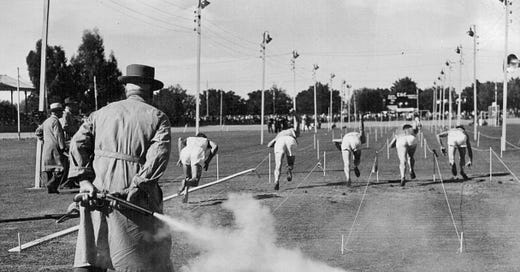Brazil’s legislative push
Brazilian legislature eyes tax boost, Georgia fail, Dutch regulatory pushback, Austrian loot box knock, Dorset gets ’smart +More
Good morning. On today’s agenda:
Brazil boost as finance minister puts weight behind legalization push.
Georgia sports betting fails to progress.
Industry bites back at ‘scary’ Netherlands regulator.
In the FUTbin: Austrian court says loot boxes are illegal.
Dorset council takes a new ’smart approach to gambling.
Brazilian booster
Brazil’s politicos have (re)fired the starting gun on legalized sports betting as they eye a tax boost.
Wake up call: A series of match-fixing scandals has spurred Brazilian lawmakers into action, with the country finally looking to progress the stalled sports-betting legalization effort. Federal deputy Felipe Carreras must now collect 171 signatures from his peers after winning approval from the president of the Chamber of Deputies of Brazil.
The senior politicians met last Thursday (March 2) to agree on a parliamentary inquiry into sports betting and a bill may appear in the coming weeks.
Finance minister Fernando Haddad is already on board, believing the taxation of overseas online operators can help fill the giant hole in Brazil’s shrinking economy.
“Gambling on the internet is taxed all over the world,” Haddad said. “It can’t be any different here.”
At the end of the drive the lawmen arrive: A special operation by public prosecutors (the catchily titled Maximum Penalty) turned up evidence of suspect play in multiple matches in Brazil’s second division last year, prompting Carreras to draft an initial proposal.
The new measures are likely to be limited to sports betting and the results of games, with other forms of gambling, including online wagering, addressed at a later time by Congress.
“The manipulation of results in Brazilian football matches is becoming more and more evident,” Carreras told local media. “There are speculations and insinuations that outside agents are acting to interfere in matches.”
“We are seeing dissatisfaction from all sides,” he said. “In Europe, we had proven cases after investigations. Brazil is not immune; it is at the apex of a nebulous environment. We will act.”
Failure to launch: Industry watchers noted the country’s reputation for the unexpected when it comes to regulation. A law passed in 2018 allowed bookmakers to offer odds on the outcome of sports events, but former president Jair Bolsonaro missed the deadline to sign the framework into effect.
“Latin America does politics somewhat differently to other parts of the world, even now – outcomes can be difficult to predict and dangerous to rely upon,” noted Regulus Partners in a recent note.
In September 2020, Brazil’s Supreme Federal Court declared that the federal government did not have the constitutional right to declare an exclusivity on the operation of lottery games.
The decision opened the door for other forms of gambling to become legalized.
Following the court’s ruling, each of the country’s 26 states were free to organize and promote their own lotteries without government interference.
** SPONSOR’S MESSAGE ** Odds On Compliance is a technology and consultancy firm specializing in sports betting, iGaming, gambling compliance, and regulatory frameworks. We assist in navigating and staying up-to-date with rapidly developing regulatory compliance frameworks at state and federal levels. Our flagship product Playbook features carefully curated and updated statutes, regulations, and requirements enabling businesses to stay in step with the regulatory agencies. Visit www.oddsoncompliance.com.
Georgia stumbles
One of Georgia’s three sports-betting bills went down in defeat last week.
You shall not pass: SB 57, which would have legalized retail and mobile betting, along with parimutuel betting, was defeated in the Senate in a 19-37 vote.
SB 57 sought to legalize sports betting through the state lottery, which has been argued eliminates the need for a constitutional amendment.
A similarly structured bill (sans the parimutuel betting component) did not pass through the House on Monday – Moving Day in Georgia, which is the last day for a bill to pass its house of origin.
The third bill takes the constitutional amendment route. It received a majority vote in the Senate on Monday, but it requires a two-thirds majority in each chamber of the Georgia legislature and a voter referendum.
US Notebook
You do it: The Tennessee Sports Wagering Advisory Council has decided to delay punitive action against the sportsbook operators that have violated the state’s 10% hold mandate. The SWAC decision is designed to give the legislature an opportunity to amend the policy. Whether the legislature will do so remains to be seen.
Affiliates welcome… for now: Massachusetts has granted registered affiliates a temporary waiver (expires April 14) to enter into CPA agreements with licensed Massachusetts sportsbooks. The MGC will work on a permanent solution, involving a potential path to a higher level of licensure that includes revenue sharing.
Little by little: Two states saw sports-betting bills progress last week.
Minnesota: HF 2000 has passed through its second committee, receiving approval from the House Judiciary Finance and Civil Law Committee.
Oklahoma: HB 1027 passed the House Committee on Appropriations and Budget in a 27-4 vote.
Austrian court: loot boxes illegal
While Brussels moots a total ban on loot boxes, individual EU states are carving out their own approach, with Austria the latest to compare the in-game rewards to gambling.
Boxed in: Sony has been ordered to refund Austrian gamers after a court found that FIFA Ultimate Team (FUT) packs are a form of gambling. The ruling comes in response to a lawsuit against Sony in 2020 in which several players, including a minor, spent more than €400 on the loot boxes.
The District Court of Hermagor in the Austrian state of Carinthia ruled in late February that the rewards inside the popular PlayStation football game violated the country’s gambling laws.
The plaintiffs had allegedly “gambled away” hundreds of euros on FUT packs, which had an uncertain monetary value.
Since the content of the packs is dependent upon chance and the contained football players can be sold on secondary market for profit, the boxes were considered “illegal gambling” and a violation of the Austrian Gaming Act.
Most claims are for around €800, although “in a particularly extreme case, it is even up to €85,000”.
The court said Sony must refund the players and ordered developer EA Sports to add a label indicating FUT packs are “gambling games that require a license”.
Fight for the right: EA and Sony can still challenge the verdict on appeal, which given loot box sales top $18bn annually is highly likely, legal experts said.
“While there is no absolute prohibition on loot boxes in Austria, this case may have a great impact on the gaming industry in Austria,” said On Dvori, technology and gaming associate at Herzog, Fox & Neeman.
Irish online gambling expert Deirdre Leahy said the judgment marks “another milestone in the search for control of loot box sales” and other jurisdictions should take note given the “inevitability” of EU intervention.
Industry’s Dutch authority pushback
Five hit with fines, but industry bites back at ‘scary’ Netherlands regulator.
Dirty little secret: The Dutch gambling regulator has been accused of underhand tactics and resorting to guesswork in drawing up fines following the publication of five enforcement cases. N1 Interactive, Videoslots, BetPoint Group (trading as PressEnter), Probe Investments and Fairload were fined more than €26m ($27.6m) collectively by the Dutch gambling regulator de Kansspelautoriteit (KSA) in December 2022.
The operators asked the courts to stop the decisions becoming public, but their request was refused, and on March 3 details of how the five had breached rules was revealed.
N1 Interactive copped the largest fine of €12.6m for a repeated violation, following a penalty in July 2021 for the same offense of operating without a license.
Videoslots was fined €9.9m for incorrectly displaying the mark of KSA on its website while not holding an online gambling license. It was also caught out in a “mystery shop” sting by the regulator, whose officials posed as a German gambler.
Betpoint Group was fined €1.8m, while Probe Investments will pay €1.1m and Fairload €900k for the same offense.
The fines were based on turnover of the operators, as per legislation adopted in September 2021.
Too late to apologize: Videolots said the regulator’s logo was mistakenly posted on its website for a short period of time before being quickly removed, as it applied for a license in April 2022.
On noting the logo, KSA officials unsuccessfully tried to sign up as a Dutch customer, before gaining access by posing as a German punter, making a deposit and placing a single bet of 20 cents.
Videoslots breached the Dutch Gaming Act by allowing access, the KSA said, but the company insists the law does not apply to its services as it does not target punters in the country.
In the case of PressEnter, the KSA said it was able to make a deposit of €10 from a Dutch bank account and that ‘Netherlands’ was offered as a drop-down option at several stages during the sign-up process.
Fight the power: “Sometimes you need to stand up for what is right,” said Alexander Stevendahl, Videoslots’ CEO, in promising to challenge the ruling after accusing the regulator of abusing its power. PressEnter has also disputed its fine and elements of the KSA’s investigation and is exploring legal action.
Supportive social media posts from a wide variety of iGaming figures followed.
“Extremely over the top from the regulator if this is what happened,” said Josh Jones, CIO at integration platform Symplify.
“KSA trying to get a quick win and big headlines with this action,” added Thomas van den Berg of BitStarz Casino.
“KSA fishing expedition,” said Ivonne Montealegre, founder of Maltese-based operator Fiebre de Casino. “Pure solicitation.”
Straight outta proportion: Videoslots said the turnover figure was “drawn up carelessly”, a “guesstimate” and that “all sense of proportionality is missing” from the regulator’s approach. “No Dutch players were able to access our site during the disputed period and there was no violation as a result,” said deputy chief executive Ulle Skottling.
“It is absurd that the KSA should fine us after gaining unauthorized access,” he said. “It is simply not possible to protect fully against unauthorized access and the KSA has no guidelines on what measures are sufficient.”
The KSA did not give details of how it calculated the fines, but reiterated that “offering online games of chance to players in the Netherlands is only allowed with a license”.
“We mean business,” said KSA chairman René Jansen. “A fine is to hit where it hurts, so in the wallet. With such amounts, we think we can impose an appropriate sanction, given the illegal earnings.”
European notebook
Finland: President Sauli Niinistö is set to approve legislation that would end the distribution of state lottery Veikkaus’s profits to social causes, with all future profits going into state coffers instead.
Romania: The country’s upper house has submitted a draft law that would tighten rules on gambling advertising, including limiting the size of outdoor ads and outlawing content that promoted cash prizes.
Australian crackdown
The Australian Communications and Media Authority (ACMA) is toughening gambling regulation efforts in the country as part of a crackdown on black markets and unsolicited offers.
It takes two: The ACMA and the Northern Territory Department of Industry, Tourism and Trade (DITT) have signed up to a Memorandum of Understanding in hopes of improving compliance monitoring, enforcement and education for online gambling.
The Northern Territory licenses many of the large online bookmakers in Australia.
For this reason, there are a growing number of matters of common interest to the bodies, including licensing, unsolicited communications and self-exclusion, the communications regulator said.
Australian notebook
Entain’s Ladbrokes Australia has been fined A$78,540 by the Northern Territory Racing Commission for failure to carry out due diligence on a customer’s source of funds.
Get ’smart in Dorset
An initiative from Dorset County Council sees it work with regulatory consultancy Betsmart.
Act local: The council’s public protection team has started working with Betsmart to provide training to help them better identify non-compliance at gambling venues, including LBOs and seafront arcades.
Kirsty Caldwell, founder at Betsmart, pointed out to C+M that local licensing authorities had always had joint responsibility with the Gambling Commission to regulate gambling premises.
“In the early days of implementation of the Gambling Act 2005, the Gambling Commission would take on a supportive role in that partnership, providing guidance, training and input into local enforcement activities and inspections,” Caldwell said.
However, having moved its focus to online and having to encompass a far larger market, this support reduced “considerably”.
In response, Betsmart has produced a package of services specifically designed for local authorities, to bring collective knowledge of gambling compliance and regulations to councils that would “like to do more in this area but need a place to start”.
Complex issues: Caldwell said the thinking is to ensure all those responsible for raising standards in the gambling space are more informed on how to go about and succeed in their task. This doesn’t just involve prevention of gambling harm but also AML and fair and open practices “both of which require knowledge of sometimes complex areas of regulation”.
“It should be remembered that failure to oversee premises-based gambling effectively can also create an environment where money laundering risk can flourish,” Caldwell added.
Pushback: Caldwell said Betsmart has heard back from some LAs saying they don’t need to do much work around gambling because their local gambling premises “don’t cause any problems’. “We strongly believe that this is a dangerous assumption to work on and is evidence of a lack of understanding and awareness within the LAs themselves,” she said.
By its very nature, gambling harm is “hidden and can easily go under the radar”.
“It’s very unlikely that someone who has developed a problem gambling while visiting a betting shop is going to ring their local council to complain about it,” she pointed out.
“It’s only by having a good grasp on what needs to happen and what is happening at a local level that we can have confidence that all is well.”
** SPONSOR’S MESSAGE ** Department of Trust's mission is to turn affordability, AML, EDD and safer gambling checks from being a challenge which erodes trust, consumes resources and complicates operations into a value-add which enhances your relationship with your customers and supports your business. That's why we're proud to have such strong support from players and operators alike. Visit: www.dotrust.co.uk/
Newslines
Odds On Compliance has launched a marketing affiliate licensing portal to enhance the licenses process for affiliate sports-betting and iGaming marketing providers entering the US.
An +More Media publication.
For sponsorship inquiries email scott@andmore.media.










